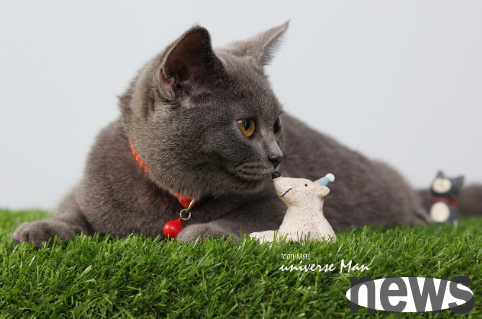"How could you do this to me after you have had it for so long?" Ms. Leng (pseudonym) was about to be discharged from the hospital and was still a little confused. The usually very docile pet cat suddenly "awed" on her lap. What frightened her even more was that a terrible germ that she had never heard of took the opportunity to enter, causing the injured leg to ulcerate and spread rapidly... The doctor said that if she came to the hospital later, she would not rule out the possibility of amputation. Fortunately, after surgery and medication, she was finally out of danger.

Doctors remind that hot weather may still occur in September. Breeding and lactating pets are prone to irritability and aggression, so precautions should be taken.
The usually docile kitten suddenly "turned away"
"I teased it as usual, but I didn't expect..." Ms. Leng, who lives in the west of Hangzhou, has a pet cat that seems to be very docile and beautiful. Over the years, Ms. Leng and her wife have been getting along with the kitten day and night, becoming very close to each other like family members.
More than 10 days ago, the kitten, which had always been docile at its owner's feet, became cruel to Ms. Leng for some reason and bit her left calf. "Oh, it hurts so much." She was caught off guard and quickly kept a safe distance from the "fearful" kitten. After careful inspection of the injury, Ms. Leng’s skin on her left calf was cracked and bleeding, causing local pain. Ms. Leng said that she "wanted to deal with it as soon as possible", so she went to a nearby clinic for disinfection and bandaging, and only received simple anti-infective treatment. She returned home without timely injection of rabies vaccine and tetanus antitoxin.
However, something unexpected happened to Ms. Leng. The wound was small but difficult to heal. The swelling never subsided and was often accompanied by bloody pus leakage. The infection site expanded uncontrollably and she could no longer walk... Ms. Leng and her husband became frightened when they saw this and immediately came to Zhejiang Provincial People's Hospital for treatment.
It turned out that this rare bacteria was causing trouble.
Fan Ben, the attending physician of Hand Surgery and Reconstructive Surgery, said that the examination showed that the patient had a 1 cm long transverse wound in the middle of the middle and lower part of the left calf, which was as deep as the Achilles tendon. The wound was congested and swollen with smelly pus flowing out, causing local tenderness and limited walking. Combined with the MRI results, the patient had abnormal swelling of the soleus muscle, the upper part of the Achilles tendon, and the subcutaneous soft tissue behind the left calf. Based on the patient's trauma, he was diagnosed with post-infectious disease. It was initially suspected that the left calf infection was caused by muscle abscess and Achilles tendinitis, but it was unknown what pathogenic bacterial infection caused such seriousness.
Dr. Li Xi, assistant director of the testing center and in charge of the bacteriology room, received the sample and found several slender Gram-negative bacilli through smear staining. Based on the patient's medical history, he basically knew it. Sure enough, after one day of cultivation, mass spectrometry identified it as Pasteurella multocida.
Fan Ben explained to Ms. Leng that the severely infected part must be removed as soon as possible and drugs should be used to inhibit the spread of infection, otherwise the entire calf will become infected and necrotic. "The surgery was to remove pus and necrotic tissue, and after extensive debridement, tendon transposition was performed to repair the Achilles tendon... The surgical wound was about 20 centimeters long." After the operation, Fan Ben told Ms. Leng that Pasteurella multocida drug treatment was also needed, which would take 1 to 6 months depending on the condition. Otherwise, the bacteria may come back and relapse, and the wound will not heal. Therefore, you must be patient to completely clear the infection.
Inject rabies vaccine for bites and scratches from cats and dogs
Dr. Li Xi said that Pasteurella multocida is a rod-shaped Gram-negative bacillus with a slightly convex center and blunt ends. It often parasitizes the respiratory and digestive tract mucosa of dogs, cats and other animals, and generally infects humans through bites or scratches from cats and dogs.
"The initial wound will appear red and swollen, rapidly spread and rupture and discharge yellow bloody pus, with severe local pain. When the bite is deep, it can also lead to periostitis and osteomyelitis. After infection, it can even cause meningoencephalitis, pneumonia, endocarditis and other diseases. The diagnosis can be based on the bacterial test results and medical history."
Doctors remind:
● Pets that appear to be healthy and frequently cleaned may be infected with a variety of microorganisms that are harmful to the human body. Whether your own pets or animals in the wild, you should keep a certain distance.
●When the temperature is high, pets tend to be irritable and restless; when animals are in the breeding and lactating stages, they are highly aggressive and may be bitten and scratched if they are slightly teased. Therefore, try to avoid the intimate behavior of petting dogs and cats.
●Once scratched or bitten by a pet, the wound needs to be disinfected as soon as possible. You can use soapy water to rinse the wound repeatedly, then wrap it with sterile gauze to reduce bleeding, and go to the hospital in time for further treatment.
●If you are diagnosed with Pasteurella multocida infection, you should pay attention and go to the hospital for regular examinations. The bacteria are relatively stubborn, often stiff but not dead, and can easily come back. Treatment must be continued until complete recovery.
●If you are bitten or scratched by a cat or dog, you must be vaccinated against rabies in time.